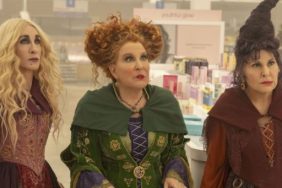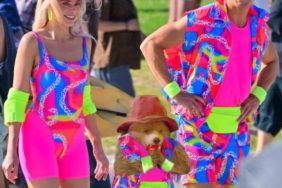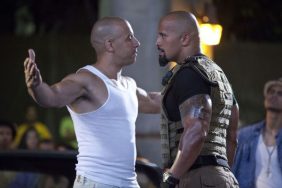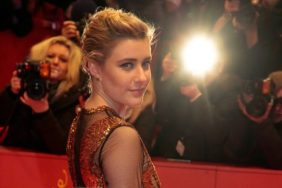
You might think, in this fancy schmancy and supposedly enlightened 21st century of ours, that fairy tales would have gone the way of the dodo by now. You would of course be wrong, because a) these tales are timeless, and b) Disney keeps making money off of them. Incidentally, a new live-action Cinderella is in theaters this weekend. Did you notice?
Since the history of cinema is littered with fairy tale movies, we thought the time had come to ask: what’s The Best Fairy Tale Movie Ever? Our film critics William Bibbiani, Witney Seibold and Brian Formo were each tasked with picking only one film to best sum up the genre, and although they couldn’t agree on a single film, they did all agree that whatever the best fairy tale movie is… it didn’t come from Disney.
Find out what they picked, and keep coming back every week for another highly debatable installment of CraveOnline’s The Best Movie Ever.
Check Out: The Best Movie Ever: Judi Dench
Witney Seibold’s Pick: La Belle et la Bête (1946)

Thanks to the terrifying influence of Disney (as well as other recent kid-friendly marketing conglomerates), the notion of the fairy tale has been transformed. Early fairy tales were, if one were to study them a bit, vaguely threatening morality plays. They were horror fables full of violence and revenge and resentment. They were strange in the old sense of the word. Even when some of the old tales were conceived of centuries ago, they felt like they already had cobwebs on them. There is nothing hip or comforting about old fairy tales, and they are meant to undercut childhood wish fulfillment fantasies while simultaneously indulging them. They are surreal tales that only rarely had happy endings, and most certainly all took place in a heightened parallel greenworld of monsters and spells.
So who better to make a fairy tale film than a surrealist and a poet? In 1946, Jean Cocteau made Beauty and the Beast, which is not only the best of all fairy tale movies, but perhaps one of the best of all films. In Cocteau’s retelling of the famed 1756 story by Jeanne-Marie Leprince de Beaumont, we have a Beauty (Josette Day) who is snippy and somnambulist, and a Beast (Jean Marais) who broods like Byron and whose claws emit smoke when he kills. The castle of the Beast is a cavernous, blackened space with living wall sconces and alert eyes that spy on Beauty from the corners of the room. There is indeed a romance, but it feels oddly desperate, and not mushy or warmhearted. This is a story of monsters and death. It’s a tale of a single rose causing a conflict. It’s a bizarre and wonderful tale of curses and enchantment. You know: the things fairy tales ought to be about.
And enchanting it is. No one can walk away from Jean Cocteau’s Beauty and the Beast without being marked and astonished. It plays like a dream, where fear hangs in the air and nothing looks quite right. And yet, you’re rapturously swept up in the hazy, halcyon romance of several lifetimes ago. It’s a beautiful, wonderful, terrifying movie.
Check Out: The Best Movie Ever: David Cronenberg
Brian Formo’s Pick: Valerie and Her Week of Wonders (1970)

Fairy tales are written by adults who paint something friendly—like a rabbit hole—around a dark abyss and jump through, holding onto their intentions to bring a lesson to a child, but taking all their adult fears down the hole with them. Since the transition from child to young adult is so difficult, I prefer a fairy tale that directly addresses that shift in body and mind, and how scary it is that adults treat you differently. Not one film does this transition better than Valerie and Her Week of Wonders. There are vampires, weasels, thieves, sexually curious priests, but this Czech fantasy film isn’t all dark—no!—there is still a playful soundtrack, a sense of awe, and an innocent desire to go to explore. Jaromil Jires’ film perfectly balances new terrors that are arriving with familiar comforts.
Check Out: The Best Movie Ever: Oscar Snubs
William Bibbiani’s Pick: Freeway (1996)

My oh my, we sure do seem to be a cynical lot here at CraveOnline, don’t we? Not a single Disney film in the bunch, all of us focusing on the tendency of fairy tales to be monstrous and wrong, somehow. For the record, I was very tempted to pick Disney’s Sleeping Beauty, but then I said screw it. Because Freeway is the obvious answer to this question.
Written and directed by Matthew Bright, and starring Reese Witherspoon before she was America’s sweetheart (and it shows), Freeway is a mid-1990s exploitation riff on Little Red Riding Hood about a teenage hitchhiker (Witherspoon) who gets picked up by a terrifying murderer and rapist named Bob (Kiefer Sutherland). Bob lures her in with promises of understanding, only to abuse her trust and… get his shit seriously fucked up because Jesus Christ this ain’t the Middle Ages and Little Red Riding Hood can take care of her own damned self, thank you very much.
Freeway takes a hard left into the oncoming lane, deviating from the original fairy tale but staying true to its intentions. Little Red Riding Hood was a cautionary tale about stranger danger, and even though Witherspoon puts Kiefer Sutherland in traction that doesn’t make her any safer as the film goes on. The world turns on her, treating her as a psychopath (partly because, in all fairness, she actually is one). It’s tough world out there for little girls – always has been – and Freeway doesn’t shy away from the whole and total nightmare. Fortunately, Witherspoon is a typhoon of fucked up rage. She’s almost someone to look up to, but in Freeway it just feels like everyone out there is a wolf in somebody’s clothing.





